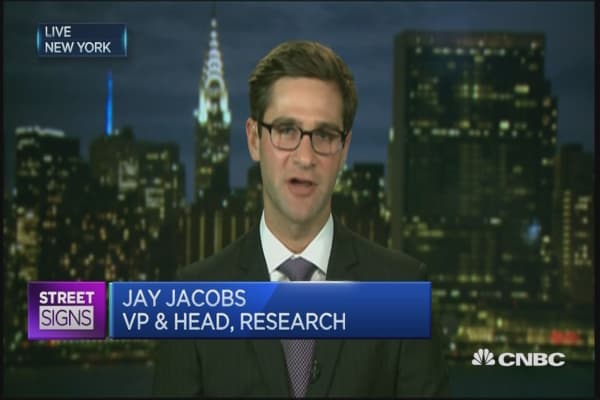How a one-two, Trump-Yellen punch may move interest rates
Interest rates could try recent highs on the potent combination of a hawkish Janet Yellen and the pro-growth talk that is likely to come from Donald Trump in the next couple days.
Trump will be sworn in as 45th U.S. president on Friday, and the markets are looking for him to play up his pledges to push forward tax breaks and infrastructure spending early in his administration. He may also take actions in his first days that reduce regulation and define his commitment to the promises he's made voters. That could be seen as a near-term negative for Treasury prices and would send yields higher.
Already, bond yields were on the rise Thursday, lifted by surprising remarks from Fed Chair Yellen on Wednesday afternoon and economic reports Thursday morning showing decades-low jobless claims, an 11.3 percent jump in housing starts and a two-year high in mid-Atlantic manufacturing activity. Also a factor was the Wednesday report of a jump in headline consumer price index inflation to a more than two-year high of 2.1 percent year over year in December.
Trump will be sworn in as 45th U.S. president on Friday, and the markets are looking for him to play up his pledges to push forward tax breaks and infrastructure spending early in his administration. He may also take actions in his first days that reduce regulation and define his commitment to the promises he's made voters. That could be seen as a near-term negative for Treasury prices and would send yields higher.
Already, bond yields were on the rise Thursday, lifted by surprising remarks from Fed Chair Yellen on Wednesday afternoon and economic reports Thursday morning showing decades-low jobless claims, an 11.3 percent jump in housing starts and a two-year high in mid-Atlantic manufacturing activity. Also a factor was the Wednesday report of a jump in headline consumer price index inflation to a more than two-year high of 2.1 percent year over year in December.
"I don't think we're going to see a huge surge in optimism again. We're not going to get another leg off of it, but I also don't think we're going to go back to where we were in October."
In her comments, Yellen said she expects a few
rate hikes this year and that the fed funds target rate could get to 3
percent by 2019 — all in line with the Fed's forecasts. But it was
Yellen's seemingly confident embrace of those targets that got the
market's attention. Markets had been skeptical of the Fed forecast, and
many economists had expected just two rate increases this year, not the
three in the central bank's projection.
"She certainly gave the market a big push. Just looking at March probabilities, they went from an 18 percent chance (of a rate hike) to 25," said Aaron Kohli, rate strategist at BMO. "The market went from pricing slightly less than two hikes to slightly more than two hikes in 2017." He said expectations in the fed funds futures for a June rate rise went to 93 percent from 85 percent after Yellen spoke.
The 10-year Treasury yield also snapped to 2.43 percent after Yellen spoke and was as high as 2.48 percent Thursday, its highest level since Jan. 3. The two-year yield rose as well, but the curve flattened, meaning the gap between two-year yields and 10-year yields narrowed. The two-year was as high as 1.25 percent Thursday.
Yellen was scheduled to speak again and take questions Thursday evening at 8 p.m. ET at a Stanford University event. The Fed next meets Feb. 1 and while it is not expected to take action, the gathering could result in some more hawkish talk.
Kohli said the next target for the 10-year would be 2.52 percent, and then 2.60 percent.
"She certainly gave the market a big push. Just looking at March probabilities, they went from an 18 percent chance (of a rate hike) to 25," said Aaron Kohli, rate strategist at BMO. "The market went from pricing slightly less than two hikes to slightly more than two hikes in 2017." He said expectations in the fed funds futures for a June rate rise went to 93 percent from 85 percent after Yellen spoke.
The 10-year Treasury yield also snapped to 2.43 percent after Yellen spoke and was as high as 2.48 percent Thursday, its highest level since Jan. 3. The two-year yield rose as well, but the curve flattened, meaning the gap between two-year yields and 10-year yields narrowed. The two-year was as high as 1.25 percent Thursday.
Yellen was scheduled to speak again and take questions Thursday evening at 8 p.m. ET at a Stanford University event. The Fed next meets Feb. 1 and while it is not expected to take action, the gathering could result in some more hawkish talk.
Kohli said the next target for the 10-year would be 2.52 percent, and then 2.60 percent.
"After the weekend and Monday, it's going to be very interesting. What happens when we get to brass tacks will be interesting for sure."
The bond market has been consolidating for the
past several weeks after the 10-year reached a postelection high of 2.64
percent on Dec. 15. That is the level that could be tested in the near
future, strategists say.
"There's a short base that will get even bolder if rates get to that level," Kohli said, adding short bets could add to the growing position sending rates higher. "I think it's very possible you get that kind of spike up. What I would suggest is as soon as that happens you might go the other way."
Money market economist Tom Simons at investment banking firm Jefferies said he doesn't see a big move in yields, but the bias should be toward higher yields, and lower prices. "I don't think we're going to see a huge surge in optimism again. We're not going to get another leg off of it, but I also don't think we're going to go back to where we were in October," he said.
"Next week we'll have two-, five- and seven-year auctions, a little bit of supply, and a light data week, so the focus is going to be on Trump, and for the most part, the first stuff that comes out of the gate is probably going to be (bond) market negative and it will be risk positive," he said.
Simons said he thought the rally in Treasurys, which drove the 10-year yield toward 2.30 percent earlier this week, was overdone.
"There's a short base that will get even bolder if rates get to that level," Kohli said, adding short bets could add to the growing position sending rates higher. "I think it's very possible you get that kind of spike up. What I would suggest is as soon as that happens you might go the other way."
Money market economist Tom Simons at investment banking firm Jefferies said he doesn't see a big move in yields, but the bias should be toward higher yields, and lower prices. "I don't think we're going to see a huge surge in optimism again. We're not going to get another leg off of it, but I also don't think we're going to go back to where we were in October," he said.
"Next week we'll have two-, five- and seven-year auctions, a little bit of supply, and a light data week, so the focus is going to be on Trump, and for the most part, the first stuff that comes out of the gate is probably going to be (bond) market negative and it will be risk positive," he said.
Simons said he thought the rally in Treasurys, which drove the 10-year yield toward 2.30 percent earlier this week, was overdone.
In the last several weeks, yields fell as
investors became disillusioned with the "Trump trade" and the prospects
for quick adoption of the president-elect's pro-growth agenda.
Trump did talk up expectations for a tax program or stimulus when he met with the press last week, and that absence raised flags about what he will get done early in his administration. Trump's focus on repealing Obamacare and his comments on tariffs both were concerns for the market, since the issue of altering America's health-care system is seen as a quagmire, while tariffs could spark a trade war.
"After the weekend and Monday, it's going to be very interesting. What happens when we get to brass tacks will be interesting for sure," said Simons.
Kohli said he expects Trump to focus on infrastructure spending and tax cuts. He could make a bigger splash in markets if he announces fiscal spending that can be put to work right away. Tax reform and cuts are also important, but Kohli said that's likely months away.
Strategists expect Trump to push forward quickly on initiatives in his first weeks, and markets will be disappointed if he doesn't. "If he squanders it, that's his downside," said Kohli.
Robert Bobby Darvish Platinum Lending Solutions
Trump did talk up expectations for a tax program or stimulus when he met with the press last week, and that absence raised flags about what he will get done early in his administration. Trump's focus on repealing Obamacare and his comments on tariffs both were concerns for the market, since the issue of altering America's health-care system is seen as a quagmire, while tariffs could spark a trade war.
"After the weekend and Monday, it's going to be very interesting. What happens when we get to brass tacks will be interesting for sure," said Simons.
Kohli said he expects Trump to focus on infrastructure spending and tax cuts. He could make a bigger splash in markets if he announces fiscal spending that can be put to work right away. Tax reform and cuts are also important, but Kohli said that's likely months away.
Strategists expect Trump to push forward quickly on initiatives in his first weeks, and markets will be disappointed if he doesn't. "If he squanders it, that's his downside," said Kohli.
Robert Bobby Darvish Platinum Lending Solutions


